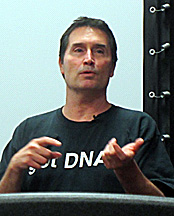
The human spirit or heart can trump bad genes. That's one of the conclusions reached by Paul Durham, Ph.D, pictured, Missouri State University Distinguished Professor of Cell Biology. He spoke at The Moxie in Springfield on April 12, 2016, after a showing of the movie Gattaca.
In Gattaca Ethan Hawke plays the role of a man deemed genetically inferior (an "In-Valid") by authorities. The problem is that in order to pursue his lifelong dream of space travel, he has to assume the identity of a superior person, one that was carefully genetically engineered in a lab. He's able to achieve this by purchasing the genes and faking identity tests using the blood and urine of this other person. However, he discovers that he ultimately needs the cooperation of other people to keep his ruse going.
This 1997 movie prefaces its plot by saying that "in the not too distant future" the employment of eugenics will become reality. In prefacing his talk about gene manipulation, Durham said "that future is today." In fact, he called attention to a clinical trial in 1988 at the University of Iowa in which ultrasound was used for the first time to look for genetic mutations with the knowledge gained as part of a decision in choosing abortion or not. This in turn leads to the use of amniocentesis or the removal of fetal cells to analyze chromosomes in order to determine markers leading to disease. As early as the 1990s when in vitro fertilization became popular, participants were able to select which embryo to implant. It becomes a moral issue, Durham pointed out, whether the procedure leads to the prevention of bringing a fetus to term with a serious disease like Down's Syndrome or cystic fibrosis or whether the decision is more frivolous, liking eye or hair color or not.
With the completion of the Human Genome Project in 2003, scientists began looking at differential gene expression as a key to the progression of disease, whether it would be possible "to turn certain genes off." This had led to several dilemmas. In discussing gene engineering Durham said that there's no guarantee that a gene can be corrected; in the outcome of Alzheimer's, for instance, not a single gene is involved but 250, and that environment must also be considered in controlling one's predisposition for a bad outcome.
A discussion about DNA sequencing led to the question of whether everyone really wants to know what diseases to which they may be predisposed. And what if the information fell into the wrong hands like the government? However, Durham's suggestion was that in knowing one's predisposition to disease, one can better control it environmentally. For instance, "a healthy brain is linked to a healthy gut," he said. Look at the health of twins of differing environmental backgrounds, Durham pointed out, in realizing the degree of environmental significance.
A discussion of the work of lead scientist Dr. Kathy Niakan in England led to ethical questions of whether allowing embryos to be edited, as in the case of screening out embryos where their DNA was not working properly, would lead to the creation of designer babies and genetically modified humans. From a societal point of view expense also was considered. Should a bad pregnancy be ended? Could problems be corrected before birth occurs or could gene manipulation create more problems? "There are no guarantees," Durham said.
"I never saved anything for the swim back" is a line from the film subject to many interpretations. Durham believes that the human spirit or one's drive is a factor in success besides having good genes.






Comments